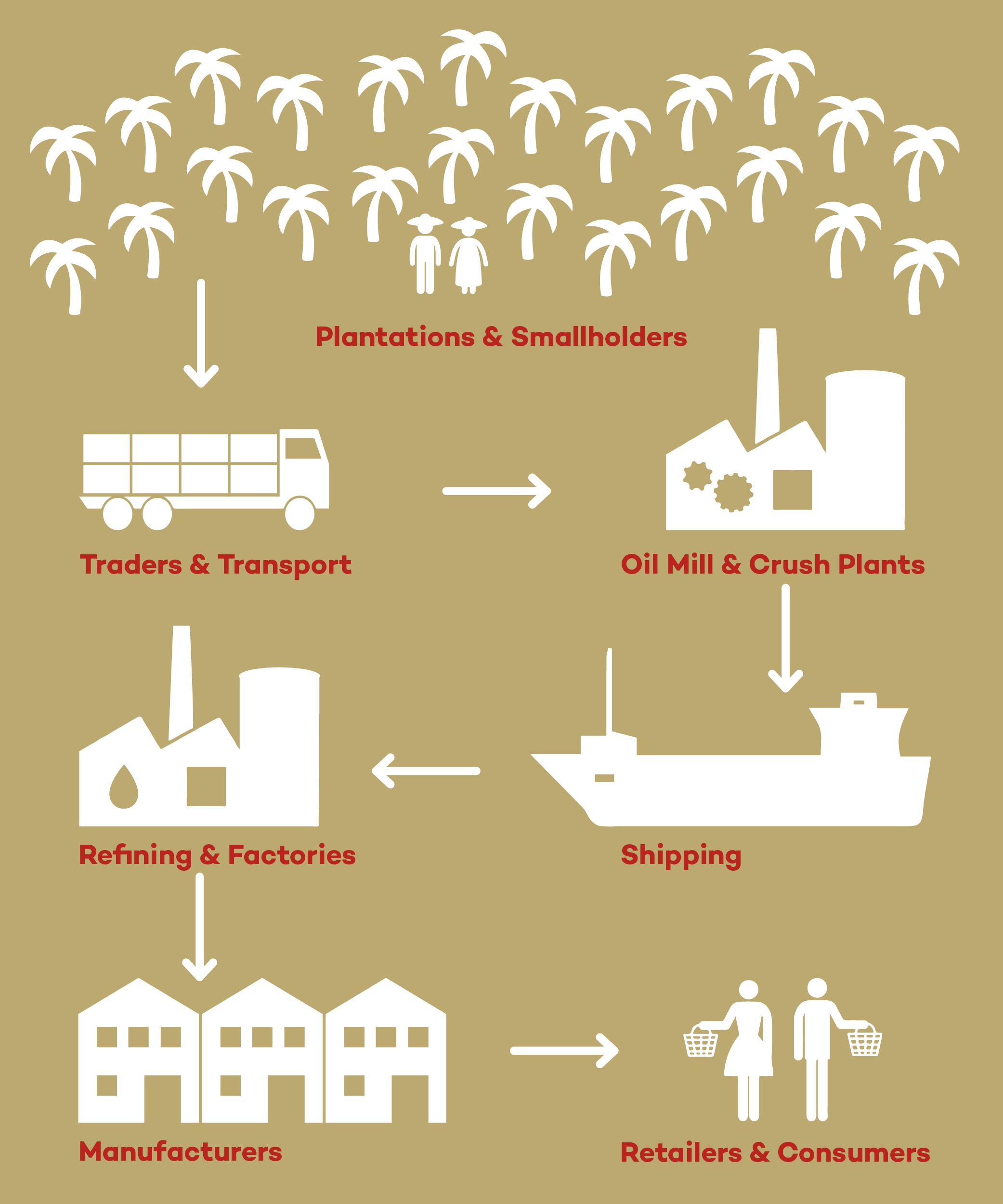Traceability & Transparency
Palm oil is the largest edible oil crop on the planet, produced in areas of the world where there is great biodiversity. This means that it’s crucial that palm oil is grown and processed sustainably. Great progress has been made – but how can we know whether the companies we buy from are using sustainable oils or not? The solution here lies in fully traceable and transparent supply chains for palm oil. Read more below why it matters and how companies are leading the way to make this happen.
Traceability
This means the ability to track and trace where the palm oil that companies use to refine actually comes from. The supply chain can be long, involving many companies both large and small – traceability is not always as simple as it seems. Imagine a palm oil mill, where the raw fruit is turned into crude palm oil; that mill can take palm oil from many small suppliers, mostly within 50km radius of the mill. Then the crude oil is transported (usually by ships, which may pick up further oils along the way) to refineries around the world. There it is made into refined oil and used in everyday consumer products.
Transparency
When companies say that they are being environmentally responsible and using palm oil from sustainable and deforestation-free sources, there has to be a way of verifying this. When international monitoring organisations give certifications to companies for their good practice, people need to be able to see why they were given, what the standards are, and how they can be reached.
Why does it matter?
With such a long supply chain, traceability is an important way to allow people to be sure they are buying palm oil that is sustainable and has not caused deforestation. It also keeps companies accountable, and it makes visible which companies are investing, buying and using 100% sustainable and deforestation-free palm oil.
We also need transparency in the palm oil supply chain – honest, open communication at all stages in the process, which celebrates the successes and flags up the steps needed to make further progress and meet all goals. It also allows growers and companies to share best practices with others in their industry and drive up standards across the whole sector. It also helps to educate others who may not be aware of the issues involved, and the progress that has been made so far.

Taking steps together
Other global organisations such as the World Wildlife Fund, RSPO (Roundtable on Sustainable Palm Oil) and Global Forest Watch are involved in transparent reporting too. The issues are so wide-ranging that only a joined-up, global system of tracing and reporting will do.
Traceable and transparent supply chains make it possible for consumers, governments, NGOs and businesses to track where and how palm oil production takes place, who is producing palm oil and how palm oil reach their final markets.
What is the industry doing to increase traceability and transparency?
- Significantly increasing the percentage of palm oil that is traceable from both plantations and mills, and making their progress public using online dashboards;
- Initiatives such as the Universal Mill List (UML) help to harmonise supply data, verify it more easily, and monitor everyone’s RSPO certification status.
- Creating Grievance Lists and publishing these online, so companies can show where problems have been brought to their attention, and how they are being resolved – and these are tracked by NGO’s and external stakeholders too;
How can you support?
There are some ground-breaking technology solutions which are seen as future ways of improving sustainability and traceability. DNA-based traceability technology, blockchain, and radar-based forest monitoring systems could all play their part. However, it’s vital that all players in the palm oil supply chain do their bit for traceability and transparency – only a universal effort will do.
And it’s only when we create a truly level playing field – so that everyone has the same obligations and the same assistance to meet them – that we can create a fair system for all. Our participants at SPOC are making sure that everyone who works with palm oil – whatever part of the business they are in, and wherever they are in the world – understands what’s required of them to ensure palm oil is produced with respect for people and nature.
We encourage others to join the aforementioned efforts to make the palm oil value chains 100% traceable and transparent! Reach out to us through our contact page for more information on how to make your palm oil supply chain fully traceable and transparent.